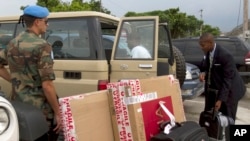Uruguay will soon pull its soldiers out of a United Nations stabilization mission in Haiti that began operations in 2004 and is facing sharp cutbacks, the leader of the South American country announced Monday.
President Tabare Vazquez said at a public event that his country's troop contributions to the Haiti mission will end this month and the roughly 250 Uruguayan peacekeepers will return home in early April. The country had as many as 1,000 forces deployed in Haiti at the height of the mission.
U.N. deputy spokesman Farhan Haq in New York expressed appreciation for Uruguay's contribution and said, "If their rotation is going to be ending now and they'll be moving out, what we're going to try to do is make sure that they can be quickly replaced so that there's no security void in the country."
The announcement by the Uruguayan leader comes days after U.N. Secretary-General Antonio Guterres told the world body's Security Council that he believed that "the military component should undergo a staggered but complete withdrawal of the 2,370 personnel" in Haiti. The soldiers come from 19 countries.
In a March 16 report, Guterres called for the military component of the Haiti mission to be wrapped up six months after its current mandate expires in April.
He also wrote that the number of U.N. police officers should be cut from 1,001 to 295 to continue efforts to strengthen the Haitian National Police and ensure "a progressive testing" of their capacity to assume full security responsibilities.
The U.N. Security Council is due to debate Guterres' recommendations and vote on the future of Haiti operations in mid-April.
The U.S. administration of President Donald Trump has pushed for cutbacks in an operation that costs $346 million a year. Washington, the Haiti mission's main check-writer, is reviewing all 16 U.N. peacekeeping missions.
Col. Luis Antonio Ferreira Marques Ramos, deputy commander of the Brazilian peacekeeper contingent in Haiti, recently told The Associated Press that "the important thing is to leave in a good way."
The U.N.'s first-ever "stabilization" mission came to Haiti in 2004 following a rebellion that ousted President Jean-Bertrand Aristide and had the chronically troubled country on the brink of collapse.




